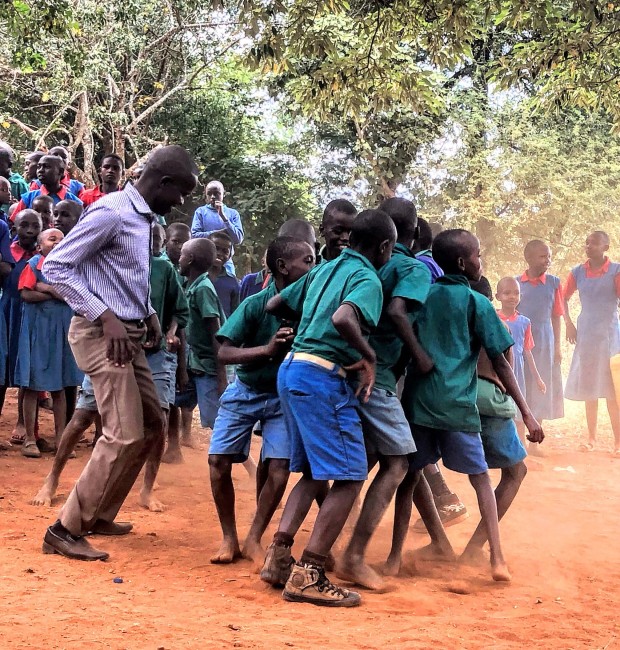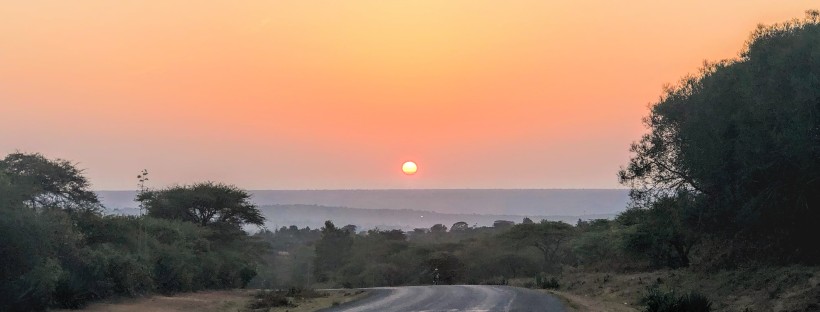The first thing that strikes me about Kenya are the sounds.
From landing in Nairobi at the airport, to the village we stayed in, it’s the sounds the pop up in my mind: brightly-colored, bustling matatus honk as their exhausts loudly blare and swerve through streets; men dressed in bright pink shirts play trumpets on a truck bed as they drive down the street. Even the language— rich, velvety accents that transformed European English into something beautiful and unique— reminds you that this place is musical and special. Kenya is an audiophiles dream.
I don’t mean to say Kenya is “loud.” First off, it’s a big country that I saw a very small part of. Even then, my experience wasn’t that it was “noisy,” with all the negative connotations that espouses. Instead, it is a space where sound resonates deeply. In the city, it’s urban rhythms of street vendors and throngs of people moving around. In the village, the days and nights are equally alive— cows moo, sheeps bleat, people call out in greeting as you pass by. At every community we visited, there is a welcome of song and dance, voices and footsteps creating a beat that moves through you as you enter a new space.
It’s different than New York or Los Angeles, places where sound seems to beat at or on you– both prepositions implying a cacophony of noise thrown at you very much against your will, your best hope to shield yourself from the hailstorm. Kenya’s sounds, in comparison, feel much more like the first time you hear the rhythm of a song you think you once knew, and that you want to learn again.
It makes sense, since Africa itself is the original heartbeat of our world. It’s where our origin story starts. Kenya’s sounds weave through our very DNA, and being there triggered a connection that was both powerful and jarring. It was powerful how deeply the rhythm of Kenya can speak to the soul, and it was also jarring, because it’s effect was both unexpected and, in some ways, uncomfortable. How can I try and capture that, given who I am? How can I begin to tell you about my time in Africa? How can my short experience in any way encapsulate this place?
We’re told in the West that Africa is “foreign” and “dangerous.” It’s also a place that still very much grapples with the oppressive and colonial history foisted on it. My privilege and lack of understanding was evident from the moment we drove through the city. Who am I to make any connection to a place I clearly do not know enough, if anything, about?
Now, though, I see just how wrong I was. I see that Africa itself holds the origin of so many things, a great cradle for the beginning of earth and life itself.
There was a part of me that honestly thought I wouldn’t be able to write about Kenya. It was too hard. It wasn’t my story. There was too much to try and convey: the bare-walled and dirt-floored classrooms, with wooden benches filled with some of the widest smiles you’d ever see. The smell of the sewer, open in the streets, that we walked over to see where students at the Bethany school in the Kawangware slum live, because the director wanted us to understand what his students overcome to get to school. The way it felt when, despite challenge we think we know about living in a slum, the women in every home we visited said, “Karibu,” and welcomed us in so lovingly so we could hear their story. The powder blue shirts and brightly patterned hair-wraps of the Kithito Kya Kyeengai women’s group as they danced and shuffled over red dirt up the hill to the commune they rented to work and share music and song. The quiet, stoic pride of a nineteen-year-old named Tony, gallant in coveralls and rubber boots, as he told us, “I am not a proud man, but I wanted to have something of prestige for my family and my town.”


It felt (and still feels, frankly) like too much to try and write down. Each experience was so personal yet so removed from my everyday life, and I don’t always know how to marry the two feelings together. I initially decided wouldn’t bother trying. I’d squirrel away the memories for myself instead, privately ruminating over them like worry beads in the hand of an anxious thinker.
Then, on our last night with our hosts at Kenya Connect, the staff threw us a going away party in their bright yellow and green buildings. There was food and song, as there had been in so many places, and the staff was kind enough to present us with our own Kenyan Animal Connections– the animals they thought best embodied our personalities. We laughed and became teary-eyed as we were connected to elephants, giraffes, gazelles, and impalas.
“Finally, Mwikali,” said James, one of the organizations Executive Directors. Lean, elegant, and quietly funny, James had called me up but my Kikamba name, given to me by a group of Kamba children at the first school we visited, meaning “the one who stays.” He invited Sharon, the other ED of Kenya connect, to present me with my animal. I nervously rose up, wondering what their impression of me was.
“These creatures are known for looking out over the Savannah and observing that everything is safe. They’re named for the feathers on their head, which looks like a quill behind their ear, and we know how proud you are to be a writer.”
Then, she handed me a beautiful wooden carving of a long-legged, heavily-crested bird. It was the Secretarybird, a crane-like, fierce looking creature. I was in love.
James nodded as I looked at the beautiful plaque presented to me. “We hope you write good stories about us. We hope you share what you have learned here.” He smiled at me as I sat down.
And I knew what I had to do.
As much as I‘m still trying to figure out my relationship with Kenya, I know that I should still try and tell this story. I know it’s not my voice that matters most, but perhaps sharing what I saw can help center us all on the voices that do need to be at the forefront of talking about this beautiful place.
The next morning, I went on an early morning run as I had done every day that week. The red dirt and rolling hills along the country highway were filled with scrubby brush and trees, and Kenya’s winter made for perfect running weather. The road was occasionally populated by matatus, or people riding their bikes. Men, women, and children passed by in brightly colored outfits headed to some of the shops or boda boda stands that lined the road. At the beginning of my trip, I had smiled at people, but generally kept to myself— I was a woman alone, after all, and I take precautions to try and ensure I don’t invite unwanted attention in ways that might jeopardize my safety.
After a few days, though, I began to see familiar faces and feel more comfortable out on the road. By the last day, I was smiling and greeting people as I past by, and was met with loving, animated responses and cheers as I ran.
As I crested a hill at the half point of my run, I looked up to see a bright, beautiful red sunrise on the horizon, a ball of flame that completely enveloped the sky around it. It stopped me my in my tracks, my heart squeezing at the powerful, ethereal thing I was witnessing, the sun blazing over the rim of the Kenyan horizon. It was the stuff of movies, and the sheer spectacle of color overwhelmed me as I watched.
I took a moment to marvel, and then take some photos before turning around, and saw that the moon was also high above the horizon on the other side as well. A complete 180° of the cosmos enveloped the village, arcing over to hold that moment and everything in it– me, the village, the brush, the people, the sky– in a perfect embrace.
I stopped, eager to appreciate just how blessed I was– I was a girl who had traveled halfway across the world and found myself cradled between the heavens. I had come to the place where our earliest ancestors were founded, a place where music, history, art and civilization had so many of its origins, and a place that had overcome and thrived in a world that often denied its brilliance– and been gifted the feeling of belonging in that beautiful place. Africa did not ask me if I was worthy of that experience– I was not– but simply asked that I exist in kinship with it.
I closed my eyes and heard the steady thumping of my own heart, a song that I admittedly rarely take the time to listen to. And in this moment, I finally understood how powerful Africa is and my time in Kenya. In a few short weeks, being here had taken two juxtaposed ideas in my mind– connection and the unknown– and melded them together. It showed me that the rhythm beating throughout Kenya was linked to the beating of my heart, an ethereal rhythm of the heavens much bigger and grander than I thought possible. It existed in every child’s dance step, in the voices raised high in welcome, in the hands working to thrive each day.
My trip had shown me that the actual human experience is so much deeper and more nuanced than the dichotomy I had created. Instead, it revealed that there are songs and singers more powerful than the lines I have used to try and define the world. They are there, as they have been for millennia; I need only I take the time to see and, more importantly, listen to them.

Thank you for sharing your beautifully written experience.
LikeLike
Very deep and inspiring insights. You have put a good light of our mathaland Kenya.
Looking forward to reading more about your experience here.
Salute!!
LikeLiked by 1 person
Reblogged this on milabantu : the soul of a brown boy and commented:
A must read!!
LikeLike